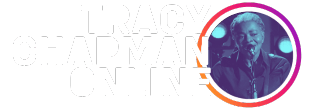By Nick Marino, The Florida Times-Union , September 13, 2000
Talking to Tracy Chapman is something like pitching baseballs to the world’s most patient batter. She stands tentatively over the plate, eyeing each question carefully as it sails in. She barely responds if she deems the question just high or a little outside. But when she finally gets a pitch she likes, she’s not afraid to swing, delivering articulate meditations on her life and music. Chapman can afford to approach the game this way because she has paid 12 years of dues in the major leagues. She released her eponymous debut record in 1988 and became an overnight success (literally) when she played at the internationally televised concert for Nelson Mandela’s 70th birthday. After that, her breathtaking single Fast Car soared up the charts, establishing sincerity and hopefulness as her trademarks.
Via phone from Salt Lake City, Chapman said she doesn’t really think about her music’s effect on fans, and she hasn’t spent much time reflecting on her proudest moment. Ball one and ball two, respectively.
Mercifully, Chapman laid down a soft bunt when asked about maintaining her idealism and avoiding the crutch of jaded irony.
“It’s just about trying to be true in what you express,” she said, adding (after an eight-second pause), “I don’t know. I’m not sure how you avoid [cynicism]. Some people, I guess, try to go for that sort of thing. It’s just not something I’ve wanted to express in my songwriting or through my records.”
Like Natalie Merchant and a handful of other singer-songwriters, Chapman has chosen to focus on relationships and social injustices. She demonstrated her compassion and liberal politics in songs such as Talkin’ ‘Bout A Revolution and Subcity, as well as through appearances at Farm Aid and Amnesty International benefit shows.
Though her debut album remains her most stripped-down effort, Chapman’s approach to music has remained constant through the years. Her soft voice over a strumming acoustic guitar provides the bedrock for almost every song. If you attend tonight’s concert at the Florida Theatre, don’t expect gimmicks or lightning-fast guitar solos. It’s the message that matters, which is why her newest album is called Telling Stories.
“I think [storytelling]is actually at the core of everything that people find entertaining in their lives, whether it’s a television show or a book or a movie,” she said, hitting an easy pitch down the middle. “And often you find that the story is an age-old story, you know, nothing new. It’s kind of drawing on themes that have been a part of storytelling since the beginning of what we know of as written word.”
The commitment to storytelling has paid off critically and commercially. She sold 10 million copies of her first record, winning Grammys for it and for her 1995 release New Beginning.
“I’ve always tried to make the best record I could for that particular moment in time,” she said. “And, of course, when you look back at things, there are a million things you might want to do differently. But, I’ve tried to be true to myself . . . It’s great to be able to continue to make the kind of music that I want to make. I think that’s something that I couldn’t have predicted for myself when I first started out. Or anyone else for that matter, I think, wouldn’t have thought that that was possible.”
Everyone would have thought it unlikely, then, that Chapman would go on to work with artists from B.B. King to Pavarotti. Nor would they have thought it likely that her music would influence the lives of millions of listeners. Chapman admitted the power of music in general, but she refrained from talking (or thinking) about her effect on her fans.
“I guess I think I understand the power of music or the potential power of music from my own experience, in that music’s always been a part of my life,” she said. “It can definitely be a force that can not only entertain you, but inspire you, and motivate you and give you a sense of belonging or a sense of your place in the world. . . . And then also once you experience music in a larger public context, then you have the communion that you get from being in one place at one time with other people that are enjoying the same thing, enjoying the music.
“So I kind of get all that, but I don’t think about what happens once I finish my part of the process of making the music and how people choose to interpret it or have it be a part of their lives. I’m not making music to try to influence people or change people. It’s more of an opportunity for me to express myself and explore ideas and entertain myself.”
At last, a home run confessional moment, followed by another about the importance of maintaining a balance between her work and private life.
“I’ve been out touring now since February, that was when we started doing rehearsals, and I’ve been home for not more than a week or so,” she said. “So that dog-walking time has not really been part of my life, and it should be and I want it to be. It’s all about finding the balance, and I’m just working on that . . . If I don’t take time for that part of my life, then I don’t really have anything to offer musically, because I don’t think most people want to hear songs about life on the bus or the hotel room. ”
SHOW INFO
What: Tracy Chapman.
When: 8 tonight.
Where: Florida Theatre, 128 E. Forsyth St.
Cost: $29.50 and $36.50.
Information: (904) 355-2787.
(Copyright 2000 © ProQuest Information & Learning Services ; All Rights Reserved)

